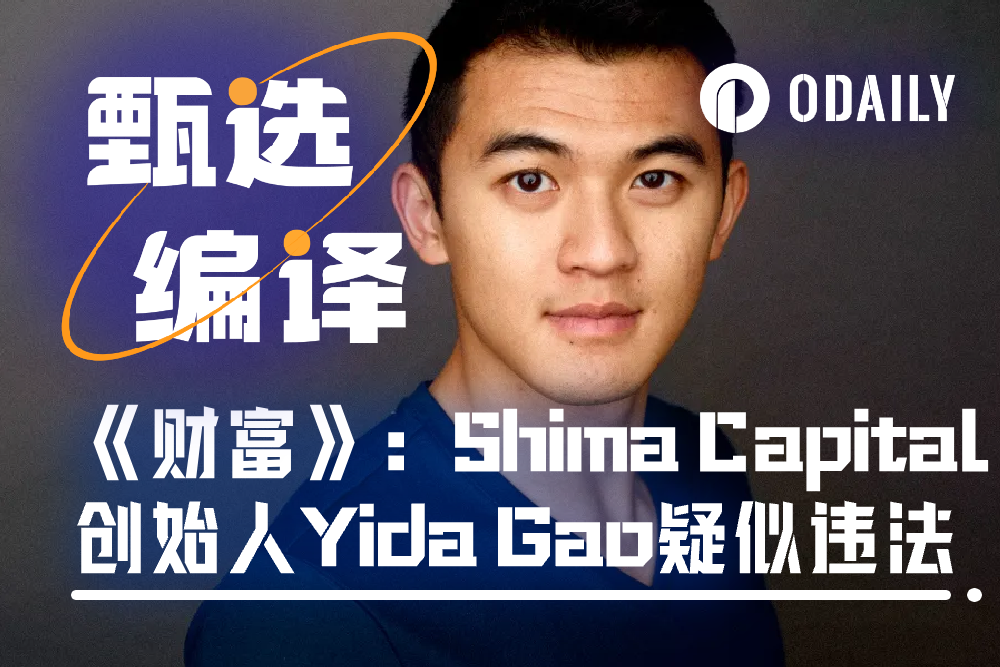Fortune: Shima Capital founder Yida Gao suspected of setting up offshore companies for personal gain
Original article from Fortune Magazine, author LEO SCHWARTZ
Compiled by: Odaily Planet Daily Husband

When Yida Gao, a former varsity pole vaulter and Phi Beta Kappa honoree, returned to the Massachusetts Institute of Technology (MIT) in 2022, he faced a big challenge. MIT invited him to teach a graduate course on "Cryptocurrency and Finance" at the business school, a position previously held by current U.S. SEC Chairman Gary Gensler.
Just a decade removed from his undergraduate studies at MIT, Gao is undaunted. After landing on Forbes’ 30 Under 30 list, the Chinese immigrant has risen through the crypto world with his own blockchain-focused venture capital firm, Shima Capital. In a short period of time, Gao has raised $200 million from financial giants like Bill Ackman and well-known cryptocurrency companies like Dragonfly and Galaxy, quickly becoming one of the most active investors in the crypto space by participating in more than 300 deals.
Gao's rise was rapid, but he also took some shortcuts. An investigation by Fortune magazine found that Gao created a secret offshore entity and transferred the assets of his venture capital fund to a company established in his own name without the knowledge of his investor Ackman and other investors. Eric Hess, a lawyer specializing in digital assets and venture capital, said: "Gao's actions directly violated the provisions of the Investment Advisers Act."
Gao has not been charged with any crimes, and a Shima Capital representative told Fortune that the firm does not comment on “regulatory matters of this nature.” But according to an unnamed source, Gao’s poor performance and behavior appear to have violated the SEC’s investor protection rules, causing the one-time cryptocurrency star to have trouble raising more capital. Despite the market boom, a Shima representative told Fortune that the firm is not currently raising money.
In the past few months, Shima Capital has seen the departure of several senior executives, including Chief Technology Officer Carl Hua and Head of Research Alexander Lin, who left earlier this year to start the venture capital firm, and Chief Office Officer and Head of Platform Hazel Chen. The departing executives did not respond to requests for comment.
Meanwhile, despite the current bull run in the cryptocurrency market, Shima appears to be struggling. Its latest SEC filing shows assets under management of about $158 million, down from the $200 million Shima raised in 2022, although this metric does not directly reflect the fund's performance.
Gao has managed to convince an elite group of investors to back him and remain active in the space even as corporate misconduct is as common in the cryptocurrency world as seized Lamborghinis. His missteps could provide fodder for critics of the industry.
Shell Game
The latest in a string of cryptocurrency geniuses, Yida Gao has taken a more traditional path—clean-shaved, toned, and an impressive blue-chip resume. He began his career in finance at Morgan Stanley, focusing on mergers and acquisitions. In his spare time, he invests in startups, often working with a well-connected entrepreneur named Adam Struck. Gao worked at venture capital giant New Enterprise Associates and briefly attended Stanford Business School before dropping out to join Struck Ventures full-time in Santa Monica.
While Gao’s partnership with Struck seemed to be thriving in the public eye, by 2019 the relationship had become strained behind the scenes. Struck filed a lawsuit alleging that Gao had secretly stolen proprietary information and set up a competing venture capital firm, Shima Capital, which was incorporated in Puerto Rico. Gao denied the allegations, claiming that Struck “devalued” his contributions and refused to acknowledge their 50/50 partnership, which had prompted him to strike out on his own.
Struck has not commented on the legal dispute, which was settled in October 2023. Although the settlement remains sealed, Struck's lawyers accused Gao in court documents of setting up a "shell game" of companies, including a British Virgin Islands entity called ShimaB that was wholly owned by Gao.
Even as he sparred with Struck, Gao used his stellar resume and confident demeanor to convince top crypto and finance figures, including Bill Ackman and former presidential candidate Andrew Yang, to invest in him. Shima began participating in deals in May 2021, and by September 2022 had invested about $100 million in about 200 projects, according to an investment calendar reviewed by Fortune. Not everyone was impressed by Gao's naive charm, however.
Some investors, potential backers and people interested in becoming portfolio companies described Gao and his team to Fortune as young and inexperienced, not quite knowing what they were doing but riding the cryptocurrency wave nonetheless. One anonymous source said Gao was one of the more casual blockchain investors, which could be an attractive bet for backers.
The bet on Gao soon proved problematic. Most notably, investors began to worry about how his firm valued its investments, and people familiar with the matter told Fortune that Gao would mark up Shima’s holdings based on his own estimates—an unusual practice that was noted in a 2023 Financial Times article. Gao responded by saying Shima would soon have accounting overseen by professional fund administrators.
In another example, Shima valued its investment in cryptocurrency exchange Chatex at $250,000 in a document reviewed by Fortune, even though the U.S. Treasury sanctioned Chatex nearly a year ago for facilitating illegal activities such as ransomware and darknet markets. A Shima representative told Fortune that the company ultimately wrote off the investment in the fourth quarter of 2022, though the funds remain frozen pending resolution of the company’s sanctions issues.
Despite Gao’s promise to find an auditor, The Block reported in July 2023 that Shima had trouble recruiting an auditor, with two prominent accounting firms rejecting it because Shima exceeded their risk parameters.
An April 2024 SEC filing lists a Cayman firm called MHA Cayman as Shima’s auditor, and a Shima representative confirmed that MHA completed Shima’s 2023 audit in May 2024. MHA did not respond to Fortune’s multiple requests for comment.
'It doesn't make any sense' On paper, Gao sold investors a standard product. He would take their money and invest it in early-stage blockchain companies, providing exposure and staggering upside to the hot industry.
But Shima’s difficulty finding an auditor is unusual for a U.S. venture capital firm. So is the existence of an overseas company owned by Gao, ShimaB. While many U.S. cryptocurrency VCs have set up offshore entities due to the uncertain regulatory environment at home, those entities are owned by the company, not the individual running it.
Gao did share a “fund structure” document with potential investors, outlining a network of Shima-owned limited liability companies that would hold investor capital and make investments, including several registered in the Cayman Islands.
But other internal documents reviewed by Fortune tell a different story. ShimaB, an entity Gao set up in his own name while working with Struck, does not appear in Gao’s fund structuring documents or in the prospectus shared with investors.
Meanwhile, other internal documents outlining Shima’s holdings show more than 100 investments owned by Gao’s Shima B from mid-2021 to the end of 2022, after Shima announced it had raised $200 million.
While there is no evidence that Gao set up an arrangement to misappropriate assets, experts said the structure appeared to be a serious violation of conflict-of-interest rules set forth in the Investment Advisers Act, which spells out the ethical obligations venture capital firms owe their investors. In ShimaB’s case, the law appears to prohibit Gao from using investor funds to invest in entities he legally owned without proper disclosure.
The reason, beyond basic transparency, is that if something happened to Gao, such as a sudden death or bankruptcy, ownership of the investment could be disputed. “I don’t think that’s a defensible strategy,” said Hess, the VC and blockchain lawyer.
Warning signs
In late 2022, Shima’s investors began to discover discrepancies in its ownership structure and valuations and alerted Shima’s management. Galaxy successfully redeemed its investment. Other smaller investors, including Bill Ackman’s family office and Dragonfly, have largely stayed out of the dispute. That’s because their investments are relatively small, according to sources familiar with Ackman and Dragonfly’s operations. (Representatives for Galaxy, Ackman and Dragonfly declined to comment.)
In March 2023, Gao sought to allay concerns by meeting with Shima’s small advisory board and disclosing that the firm had used ShimaB to “warehoused” investments, a term that describes deals that are parked prior to completing a full investment round.
Shima claimed it made those investments using investor money but always intended to move it to the company, according to the minutes. In response to a series of questions from Fortune, a Shima representative repeated that the company made warehousing investments through “related” entities, including ShimaB, and that it had moved the investments into Shima’s new fund.
However, neither the minutes nor the representative’s response indicated that the company had disclosed the ShimaB arrangement to investors, nor did it reflect that Gao was moving their funds in his own name rather than through Shima. In addition, it is unclear whether Shima would have been able to transfer all of his investments back to the company due to the allocation restrictions on many of the investments.
In addition to unhappy investors, Shima’s compliance issues could have legal implications for Gao and his company. Attorney Hess said the apparent conflict-of-interest violations could lead to a slew of problems with the Securities and Exchange Commission (SEC) if Shima failed to disclose the questionable arrangements during its review. He added that enforcement penalties could range from fines to Shima losing its investment advisory license, although he didn’t think it would rise to the level of fraud.
Despite the shady record, Shima continues to be active in trading. Investors are piling back into the cryptocurrency market, with popular meme coins like Dogwifhat rebounding alongside regulatory victories in the U.S. In April, Shima was listed as an investor in a token round for a new blockchain for another dog-themed coin, Shiba Inu.
Gao may not be alone in the cryptocurrency world. Yet for an industry trying to shake off its unruly reputation, he offers a cautionary tale for investors looking to avoid the mistakes of the last bull cycle.



